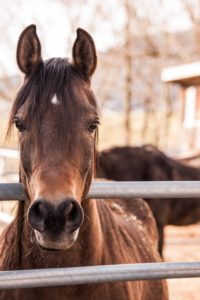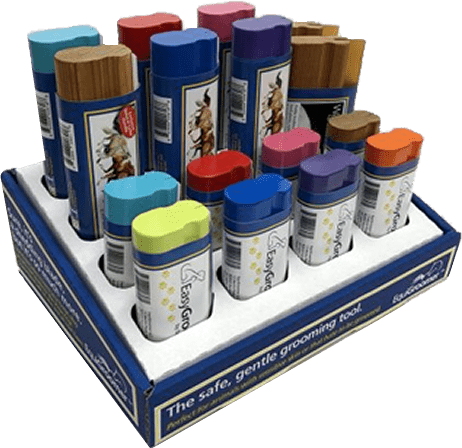Welcome back to the second part of How to Get Rid of Biting Summer Flies!
Our last post focused on one of the most common biting flies, the horse fly. In this second part, we will continue to look at how to get rid of biting summer flies with natural repellents and more!
Flies, Flies and More Flies!
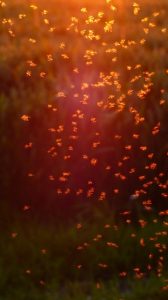 What exactly are horse owners up against when it comes to flies in hot summer months? A variety of flies that bite, draw blood and irritate and annoy both you and your horse!
What exactly are horse owners up against when it comes to flies in hot summer months? A variety of flies that bite, draw blood and irritate and annoy both you and your horse!
Common flies (beyond the horse fly we discussed last time) include:
- Stable flies
- Black flies
- Deer flies
- Sandflies and biting Midge Flies
Why are flies such a problem for equines? Flies can:
- Carry and spread diseases.
- Cause allergic reactions.
- Cause infections.
- Create digestive issues.
- Chip or break your horse’s hooves from continuous stomping to get rid of flies.
Fly Prevention: Best Practices
Prevention is critical since a single fly can produce up to 1,000 flies in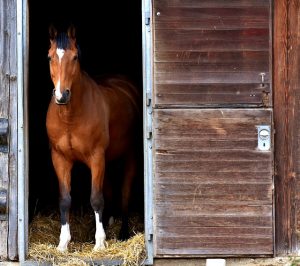 less than a month! Using a combination of fly control options will offer the best results. Below are 6 best practices for your horse and barn.
less than a month! Using a combination of fly control options will offer the best results. Below are 6 best practices for your horse and barn.
- Strict and regular sanitation protocols will help decrease and discourage the creation of fly populations by keeping your barn odor- and ammonia-free.
- Address fly breeding and larvae hatching by regularly eliminating potential moist or damp areas where flies prefer to lay their eggs including:
- Manure in your barn, yards and fields (which offer breeding places and constant food sources).
- Decaying plant waste (i.e., rotting logs).
- Damp straw, rotting hay and moist soil under hay bales. Consider replacing straw bedding with rubber matting to reduce overall barn moisture.
- Use moisture-soaking materials and/or absorbent bedding in all stalls.
- Regularly spread out both manure and stable bedding so it dries out quicker.
- Drain all areas where excess water/rainwater gathers and pools.
- Address fly breeding and larvae hatching by regularly eliminating potential moist or damp areas where flies prefer to lay their eggs including:
- Regularly treat all stable surfaces (sides of the barn, stall surfaces,
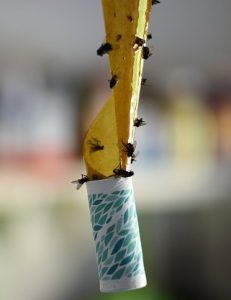 fences and piles of manure) with a reliable fly control option or an insecticide, pesticide or larvicide.
fences and piles of manure) with a reliable fly control option or an insecticide, pesticide or larvicide. - Protect your horse from flies with sprays or dusts. Use oil-based fly sprays that remain effective longer (water-based products usually offer shorter residual effects). When applying, be careful around sensitive areas like your horse’s eyes, ears and muzzle. For the safest application, spray onto a washcloth first and then gently apply or use a roll-on product.
- Use and regularly replace fly traps/flypaper.
- Always securely cover all open food and garbage containers to avoid attracting flies.
- Turn off all barn lights at night to prevent insects from being attracted to the light.
Click here for the Amateur Equestrian article, “Top 23 Ways to Eliminate and Protect Your Horse and Barn from Flies this Summer”
Fly Prevention: 5 Options
So how do you get rid of biting summer flies already in your barn, tack room and paddock?
- Fly Predators to prevent fly eggs from hatching
- Supplements containing garlic, such as SmartPak’s BugOff
- Fly sheets to not only protect from flies but also UV rays
- Wondercide Natural Bug Repellent Spray
- SWAT Fly Repellent Ointment for trouble spots where flies tend to congregate (under the chin, on the chest and around the nose)
Fly Protection: 5 Natural Options
Prefer to use natural fly protection for your horse? Try these DIY options below!
- Apple Cider Vinegar (ACV)
Not all vinegar is created equal when it comes to effectiveness and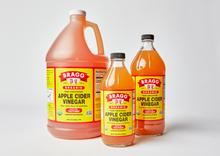 nothing is as effective as unpasteurized, organic apple cider vinegar. Just fill a spray bottle with ACV and spray down your horse for natural fly protection. If the smell bothers you or your horse, dilute with a 50/50 ratio of water.
nothing is as effective as unpasteurized, organic apple cider vinegar. Just fill a spray bottle with ACV and spray down your horse for natural fly protection. If the smell bothers you or your horse, dilute with a 50/50 ratio of water.
- Commercial Natural Fly Sprays
- Absorbine UltraShield Green Natural Fly Repellent (contains essential oils and guaranteed to last up to 8 hours)
- Animal Legends Flicks Horse and Pet Spray (concentrated and biodegradable)
- Equisect Botanical Fly Repellent Spray (contains botanical and essentials oils including citronella, clove stem and thyme)
- Calm Coat Natural Repellent (concentrated with citronella, eucalyptus and other botanical oils)
- Lemon Juice (bugs hate it!)
- Avon Skin So Soft (smells great and is a DEET-free bug deterrent for your horse and you!)
- Natural Fly Spray for Horses by Savvy Horsewoman (uses essential oils to deter flies, mosquitoes and other insects)
- 16 oz spray bottle (use amber-colored to preserve the essential oils)
- 1/2 cup witch hazel
- 1 tsp vanilla extract
- 100-150 drops of a Bug Repelling Essential Oil Blend
OR
-
- 100-150 drops of any combination of the following oils:
- Citronella
- Eucalyptus
- Lemon Grass
- Peppermint
- Cedarwood
- Lavender
- 100-150 drops of any combination of the following oils:
Add all ingredients into the spray bottle and fill to the top with water. Shake well and spray on horses and riders as needed, being careful to avoid the eyes and nose. Store in a cool, dark place.
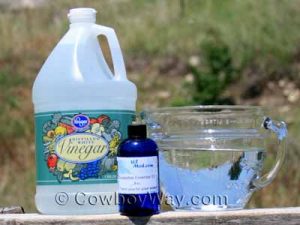
Looking for more DIY, Natural Horse Fly Sprays?
Click here to go to the Cowboy Way website for 3 easy recipes!
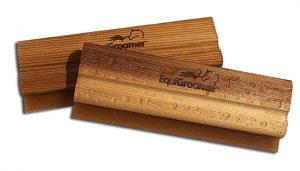 “Whisking” all sweat, excess soap and water from your horse is easy for maintaining their coat’s best condition with our innovative WaterWisk!
“Whisking” all sweat, excess soap and water from your horse is easy for maintaining their coat’s best condition with our innovative WaterWisk!
Our EquiGroomer tools make grooming your horse easier, stress-free AND pain-free!
Order individual EquiGroomer tools or professional kits for your pet shop, tack shop or barn, by calling 860-573-0604, sending us an email or visiting our website today!
Additional Reading:
Texas A&M University: Veterinary Medicine & Biomedical Sciences: Shoo Fly … Don’t Bother Me!
Savvy Horsewoman: How to Get Rid of Flies Naturally
Stable Management: Reduce Flies on Your Horses and Property
Amateur Equestrian: Top 23 Ways to Eliminate and Protect Your Horse and Barn from Flies this Summer
Horse and Rider: Fly Control Options for Horse and Barn
Image Credits:
Wolfgang van de Rydt from Pixabay
Bragg.com: Apple Cider Vinegar
Product Image Courtesy of EquiGroomer

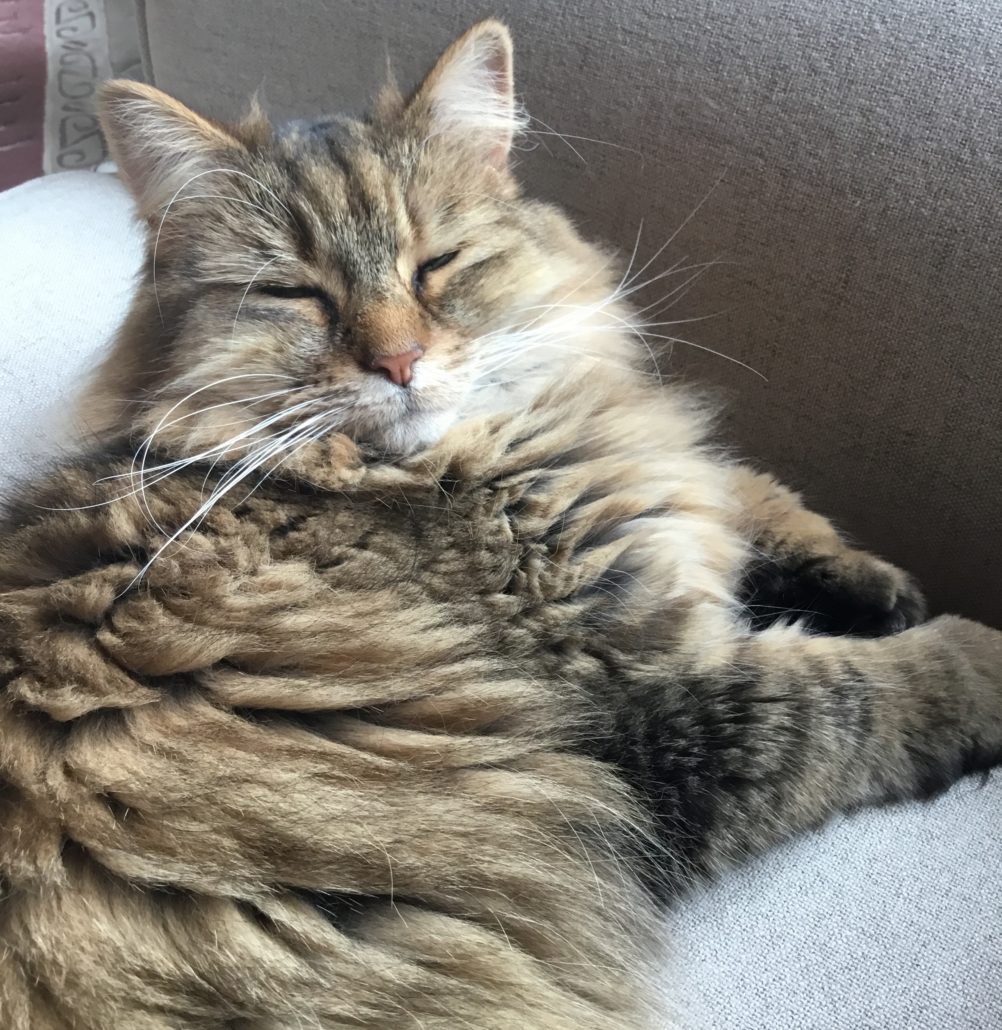
 Each stage of your pet’s life has its own requirements for well-being. The needs of a puppy, kitten or foal will be different from an adult or senior. So, it’s important to focus on the specific wellness needs and effective preventative care for their age, breed, health history and potential aging challenges.
Each stage of your pet’s life has its own requirements for well-being. The needs of a puppy, kitten or foal will be different from an adult or senior. So, it’s important to focus on the specific wellness needs and effective preventative care for their age, breed, health history and potential aging challenges.